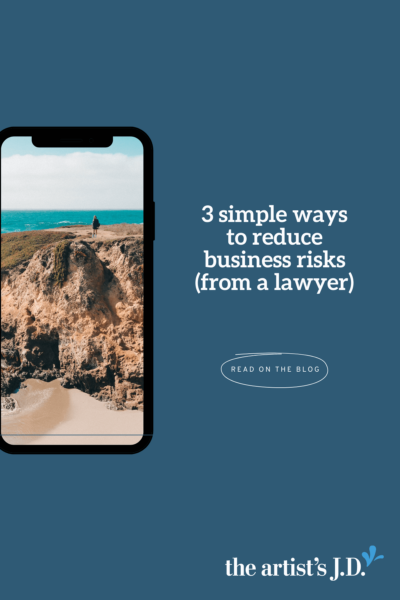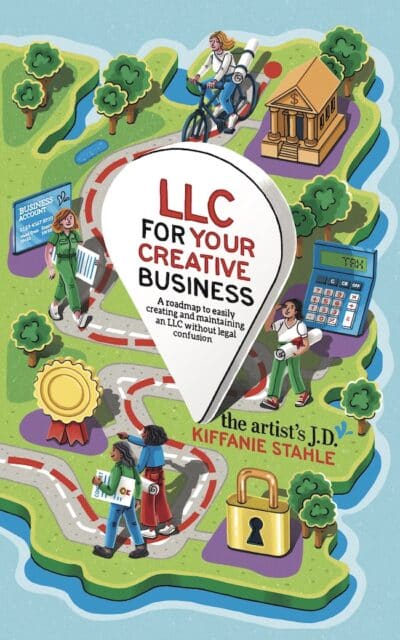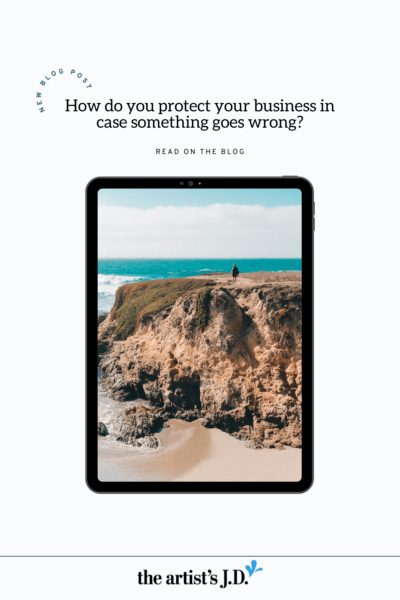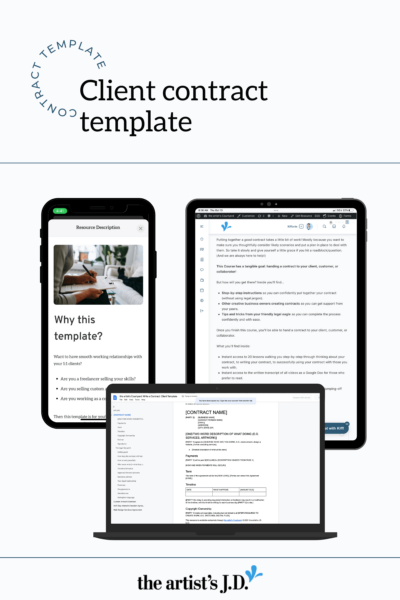No business owner wants to put their business at risk. So how do you reduce your business risks?
- How do you protect your business in case of a lawsuit?
- How do you protect your business if a client relationship sours?
- How do you protect your business if someone claims you’ve infringed on their copyrights?
Sometimes when the law and business intersect, we have to talk about unhappy, scary, things we’d rather not think about.
This is why today I want to share how to reduce your risk so that if a lawsuit happens, your business will survive it.
I wouldn’t wish a lawsuit on my worst enemy. And that’s because rarely are there winners in lawsuits. Yes, one side often walks away with a “win”, but there was a significant investment of time, money, and energy to get that. This is why most lawsuits are lose/lose propositions.
But the reality is that if you are running a business, you could be sued. No one wants to be sued and most of us are running our businesses legally and ethically to reduce our risk of a lawsuit, but mistakes happen and misunderstandings occur.
Since I’m a lawyer, I won’t focus on business practices you can put in place to reduce your risks. These might be things like:
- good customer service
- paying your bills on time
- having a process for creating social media content
- declining to work with clients that show red flags
- always using a contract with those you work with
Instead, I’m going to focus on those things you can do to reduce your business risks from a legal standpoint.
What happens if you lose a lawsuit
But first, let’s get on the same page about what is “won” in a lawsuit.
For the vast majority of lawsuits, money is the only thing you can “win” in a lawsuit.
So if you lose the lawsuit, you’ll be paying the other side. (And if you win, you’ll likely only be getting cash.)
And if you and your business are legally the same, then both your business assets AND your personal assets can be used to pay the other side.
This means that anything you personally own or your business owns can be used. And include things like:
- home
- car
- stocks
- bank accounts
- spouse’s income (in community property states)
Now just because you owe the other side money at the end of a lawsuit, doesn’t mean that they can force you to see your car or your home. But what they can do is put a notice (a lien) on your car or home that says if you sell it within the next 10 years, they are entitled to money before you.
But what if you don’t have many assets now?
You should still care about this even if you/your business:
- are in debt
- don’t own a home
- don’t have much savings
- not making much money yet
Because again, in most states, if you don’t have the money to pay them today, they can make you pay them over the course of 10 years. (And there’s the option to make you pay over the next 10 years if you haven’t settled up by then.)
So your business growth could be stunted for more than a decade. You won’t be able to invest in growing your business, because every extra cent will be going towards paying off this debt.
Simple ways to reduce business risks

From a legal perspective, there are three simple proactive steps you can take that will help reduce your business risks. (Or as I like to say, to put a fence up to protect you and your business.)
These simple steps will:
- make it less likely that you’ll be forced to use your own money to pay off your business debt
- reduce the amount you’d ever have to pay out of pocket
Way #1: Form an LLC/Corporation
One of the most common ways to protect your personal assets is by setting up either an LLC or a corporation for your creative business. (FYI: a corporation rarely makes sense for 99% of creative businesses.)
Businesses become LLCs and corporations for the legalese concept of “limited liability.”
What limited liability does is erect a fence between your business and personal life. So when problems crop up, the problem stays on its side of the fence.
But this fence only exists in certain circumstances.
A fence is going to help you if:
- a studio visitor slips and falls
- if your relationship with your employee goes sour
- if someone’s business tanks after taking your course
- if your client isn’t happy with the quality of the work
- if you, your spouse. or child gets sick and you can’t pay your hospital bills
- if your spouse is laid off and you can’t pay your household bills
But there are certain instances where your fence will never help you no matter what. And when those happen your personal assets are still going to be at risk. Those are situations like:
- your landlord requires you to personally guarantee your lease
- you sign a contract as you, not as your LLC
- if you use your home or another asset as collateral for a loan or line of credit
- if you or your employee commits copyright or trademark infringement
- if you don’t disclose the whole financial truth when getting a loan or line of credit for your LLC
- if you don’t follow the ongoing legal LLC requirements
(We are going to cover how you might reduce some of these risks below.)
LLCs can give you tremendous peace of mind. But come with expectations and costs. And they aren’t right for every business. (We’ve got a whole chapter on deciding if LLCs are right for your creative business in my book. Grab it here.)
LLC’s also require you to file paperwork with your state. Like Michael Scott learned that you can’t just say, “I declare bankruptcy!” to declare bankruptcy in The Office. You can’t say, “I declare an LLC!” and become an LLC. You have to take the required steps in order to create (and maintain) an LLC for your business.
Are you overwhelmed by the legal jargon associated with creating an LLC for your creative business?

Do you wish you had a straightforward roadmap to feel confident that you created your LLC right (and know the expectations to keep it legit)? Then this is the book for you!
When you buy LLC for Your Creative Business, you’ll get my step-by-step guidance through the process of creating and maintaining an LLC for your creative business without all the legal confusion.
(If you use the above Amazon affiliate link, I’ll make a small commission, but it doesn’t change the price you pay.)
How your LLC will help reduce your risks
An LLC will put a fence between your personal life and your business life if things go wrong.
And if you do end up owing someone at the end of the lawsuit, the LLC fence will make it so that only the assets of the LLC can be used to pay that debt. All of your personal assets will be off the table.
But you don’t want something to go wrong on the LLC side and force you to close your business.
This is why your LLC shouldn’t be the only way that you protect yourself and your business.
You also should have:
- business liability insurance
- a limitation of liability clause in your terms of service or client contract
- waivers if you teach workshops
- processes to properly source images that you post on your blog or social media accounts
You should rely on these things before you rely on your LLC status to protect your business.
Because your LLC status gives you the peace of mind that your personal assets are protected, not your business ones. And these things give you peace of mind that your business assets are protected.
Way #2: Limit liability via your contracts

Another common way to limit your liability is by using either a limitation of liability or a liquidated damages clause in your contract. And these can be used by every business, regardless of their legal type.
While their names are stuffed with legal jargon, they actually are quite helpful to limit the maximum amount you could owe if something goes wrong.
A limitation of liability clause is there to cap how much you owe the other side if something goes wrong.
Since you probably don’t read the fine print, you might not know that many of the companies you work with include these kinds of clauses in their terms of service.
For example,
- MailChimp uses a limitation of liability clause to cap its liability to no more than what you paid them in the previous month.
- Meta (AKA Facebook) uses a limitation of liability clause to cap its liability to $100 or the amount you have paid them in the past twelve months.
- Etsy uses a limitation of liability clause to cap its liability to $100 or the amount you have paid them in the past twelve months.
- Squarespace uses a limitation of liability clause to cap its liability to $20 or the amount you have paid them in the past twelve months.
While a liquidated damages clause is there to pre-determine what you owe the other side if something goes wrong. This can either help to limit what you’ll have to pay the other side or can help you with cash flow by making sure you keep deposits.
When I write contracts for my wedding photographer clients, we often use a liquidated damages clause for cancellations.
Wedding photographers are booking months out and can only be at one wedding at a time. So once they’ve reserved a date for a couple, they turn away other couples looking to book that same date.
So if a couple comes back a month or two before the wedding and cancels, it’s difficult for them to recover the lost income.
This is also common with freelance writers or consultants where their contracts include a “kill fee” that kicks in when a project is canceled.
There’s no reason that you can’t do the same with your clients and customers by adopting similar language in your contracts.
Of course, this limitation only applies when you are fighting about things that came about because of your contractual relationship. Things like:
- Quality of work
- Delivering work on time
- Hours billed
- Canceling the project
It’s not going to apply if you intentionally harm your client (say for example, if you knowingly copy someone else’s work and give it to your client as your own). But it will cover many of the situations that arise.
Which of these two clauses is more appropriate to reduce your liability depends on where you live and the kind of work you are doing.
And liquidated damages clauses in particular have some specific rules and language that must be used in your contract in order for them to be legal.
So if you are considering this route and you want to make sure the clause will hold up in court either do your research or talk to an attorney where you live.
Ready to have smooth working relationships?

Have you tried to hack your contract together from free templates? Do you have a contract but you aren’t sure it really protects your business?
Get a lawyer-drafted template that gives you everything you need to create a custom contract that protects you based on your exact process and working style. You’ll go from not knowing what to include to confidently handing it over to your clients. (And the contract skips all that unnecessary legal jargon, so it’s easy for you and your clients to understand!)
Ready to sleep well knowing your contract will protect you when push comes to shove?
Way #3: Obtain Business Insurance
The final way you can limit your liability is by obtaining comprehensive business liability insurance.
Depending on your industry, these policies are inexpensive and a good way to not only get your judgment paid for but your attorneys’ fees and costs as well.
Many of you might be thinking, I don’t need that, I work out of my home and have homeowner’s/renter’s insurance. Before you jump to that as your solution, you should check your policy and/or talk to your agent because most of these policies specifically exclude coverage for home-based businesses. This is important not only because it won’t help you if you get sued, but if someone breaks into your home or there is a fire, they could refuse to replace items that are in your home that are related to your business.
Also depending on the kind of work you do, you might consider getting intellectual property coverage. This coverage is great for designers, writers, photographers, or others that create copyrightable content for their clients.
With intellectual property coverage, if someone comes to your client and says that your work infringes on their intellectual property, this coverage allows you to hire an attorney and defend your work and your insurance company will pay for it.
Got legal overwhelm? Learn how to protect your ass(ets) without legal confusion

Helping you get the right business insurance for your creative business is just one of the action items I help you complete as part of the Legal Roadmap. It’s a straightforward strategy to get all your legal ducks in a row.
When you buy the Legal Roadmap, you’ll get the easiest way to build your business on a solid legal foundation.
(If you use the above Amazon affiliate link, I’ll make a small commission, but it doesn’t change the price you pay.)
That’s it! Three simple ways to help reduce your business risks.
Do you still have questions?
No shame in that! One of the perks of membership in the artist’s Courtyard is a 24/7 private online community to ask your questions and get my answer (and insights from other creatives). Already a member? Ask your question! Not a member yet? Join us inside the artist’s Courtyard for $45/month!

Hi! I’m Kiff! I’m your friendly legal eagle (and licensed attorney).
My goal is to add ease to the legalese. And because I think basic legal resources should be available to every creative, I create a lot of free content.
If I’ve created something that has helped inject a little ease into your creative business and you would like to say “thank you”, you can make a contribution here.
If you’d like to hear more from me, I’d love to pop into your inbox every Friday morning to share additional ways to cut through the red tape and inject a little ease.
Get tips from your friendly legal eagle in your inbox…
Your privacy is important to us. Learn how we protect it here.

